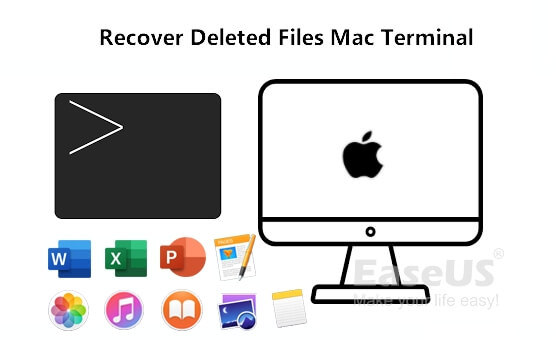How to Recover Deleted Files from Mac Terminal
Tracy King updated on Nov 27, 2024 to Mac File Recovery | How-to Articles
Don't worry if you deleted files on Mac. Here, we'll show you how to recover deleted files using Terminal and how to restore permanently deleted files due to emptying Trash, using Option+Shift+Command+Delete or RM - R - F commands on Mac with EaseUS mac file recovery software.
Accidental data loss occurs quite often during the daily use of our computer. It's not rare that you accidentally deleted the files you need on your Mac. When that happens, you will inevitably wonder how to retrieve your lost files.
Follow this guide, you'll learn how to recover deleted files on Mac in two most efficient ways:

Here we listed some normal ways of deleting files on Mac and collected two ways to help you retrieve files on Mac from different file lost situations.
Figure out the file loss reasons and select the right way to recover deleted files from your Mac now:
| #1. Use Terminal | #2. Use EaseUS Mac File Recovery Software |
|---|---|
|
|
Note that Terminal can't help you restore deleted files that are permanently deleted due to emptying Mac trash or using Terminal rm commands.
Now, it's your turn to pick the right way and follow the specific tutorial to undo file deletion or undo RM deletion command from the Mac Terminal right now.
Applies to: Restore deleted files on Mac by dragging or right-clicking moved to Trash.
It's a regular way that Mac users sometimes use Terminal to delete or undelete files. It can not only delete files on your Mac like in the situation presented above but also recover deleted files using command line.
Follow the steps below to recover deleted files on Mac using Terminal now:
(It's an example that performed on a MacBook Pro running macOS Mojave 10.14.2.)
Step 1. Go to "Finder" > "Applications" > "Utilities" and double-click "Terminal".
Step 2. Type cd.Trash and hit "Return".
Step 3. Type ls and hit "Retrun".
Step 4. Type mv yourfilename ../ and hit "Return". (It must be your full file name in the command line.)
Step 5. Type Quit and exit the Terminal window.
Step 6. Go to "Finder", enter the name of your lost file in the search bar at the top-right corner.
In the result, you can see the deleted file you just recovered. Move it to any location as you like.
Applies to: Retrieve files from Trash, Option+Shift+Command+Delete, rm, rm -R, rm -f command.
As Terminal command listed in Way 1 only works to recover deleted files from Trash. You may fail to recover your deleted files on Mac due to emptying trash, using Option+Shift+Command+Delete keys, or running rm, rm -R, rm -f command.
The other way you can try is to let reliable Mac data recovery software help. EaseUS Data Recovery Wizard can help you if you follow the above three steps to retrieve files deleted from Mac Terminal.
Steps to Retrieve Files Deleted from Mac (Undo RM -R -F):
Step 1. Scan for deleted files
Select the hard drive, external drive, or SSD where your important data & files were deleted and click "Search for lost files".
Step 2. Filter the lost files
The software will run quick and deep scans and work hard to find as many deleted files as possible on the selected volume. Filter wanted files through the "Type" and "Path" options.
Step 3. Recover deleted files
Double-click the deleted files to preview. Then, click the "Recover" button to get them back.
After restoring files from Mac, remember to save the files to an external hard drive. After making sure the device is available to save files again, you can move back the recovered files on your Mac.
What Else Can EaseUS Mac Data Recovery Wizard Do:
1. Recover files from Mac that Terminal command line can't do:
2. Retrieve multiple types of files, including:
EaseUS Mac Data Recovery Wizard supports restoring files like photos, documents, videos, audio, emails, and other files from Mac.
3. Restore data from all types of storage devices:
EaseUS Mac data recovery software can recover data on Mac(PC), hard drive, USB drive, SD card, Memory card, digital camera, etc., devices.
On this page, we showed you the normal ways that you might commit to deleting files on Mac. According to most Mac users' feedback, we also collected two reliable and practical ways that can help you safely bring the lost files back on your Mac.
Now, it's your turn. Take your time, and follow this guide to bring your files back on Mac now.
Related Articles
Updated to Sonoma, QuickBooks Keeps Crashing [with 6 Methods]
disk0s2 Not Mounted | Fix disk0s2 (Macintosh HD) Not Mounting on Mac
How Do I Restore Mail on My Mac | Mail Recovery
Find Deleted Messages on MacBook (2025 Tips)